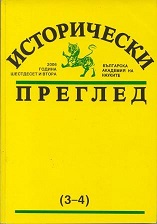Leges Barbarorum: между Рим и варварите
Leges Barbarorum: Between Rome and the Barbarians
Author(s): Doroteya ValentinovaSubject(s): History
Published by: Институт за исторически изследвания - Българска академия на науките
Summary/Abstract: The purpose of this paper is to present the historical context of the creation of Leges Ro¬manae Barbarorum, the survival of the Roman law in the barbaric states as reception, edition, transformation, and “barbarization” of Roman legal norms and moral principles, as well as the extent to which the Roman concepts of iustitia (justice) and aequitas (equality) had been preserved in those leges. During the 5th century AD the presence of new powers in the territories of the Western Roman Empire, in the face of the “barbarian” Germanic foederates, put both Germanic set¬tlers and indigenous Roman population in a new social and political, legal and institutional context. Weakening or complete absence of imperial administration created a temporary hi¬atus in the legal field; and the system of Roman law from the time of Emperor Diocletian on suffered the so-called “vulgarization”, i. e. simplification and adaption of the old system to the new social, political and economic changes . This trend was very strong in the 5th century. In the “barbarian” Germanic regna, existing on Roman territory, especially in those kingdoms (Visigothic and Burgundian) where the connections with the Empire did not cease, and their kings largely ruled as Roman foederates and magistrates, there was a need for a new legisla¬tive activity that regulated relations among the Barbarians, between Barbarians and Romans, and among the Romans. In those regna we could observe the first wave of Leges Barbarorum, as codes in Latin, reflecting, on the one hand, the German customary law, mixed with ele¬ments of the vulgar Roman law, and on the other - norms of that vulgar Roman law, codified for the Roman population. Since much of the texts of the Leges Romanae Barbarorum, mingled with customary legal norms of Germanic peoples, could not be treated as a pure element of the Roman law and the Roman legal system, but as a result of their influence, the focus of this article is mainly on fragments that reflect purely the relationship with ius Romanum and its notions of iustitia and aequitas. The main goal here is the precise translation of these elements. Their identifica¬tion in Leges Romanae Barbarorum would help to assess to what extent the legal and moral Roman principles and perceptions of equality and justice had survived in a new environment where government was in the hands of the Germanic military elite. My attention is focused on one of the major monuments testifying to this process - the Edict of King Theodoric (Edictum Theodorici Regis, Lex Romana Ostrogothorum).
Journal: Исторически преглед
- Issue Year: 2012
- Issue No: 3-4
- Page Range: 3-26
- Page Count: 24
- Language: Bulgarian
- Content File-PDF

